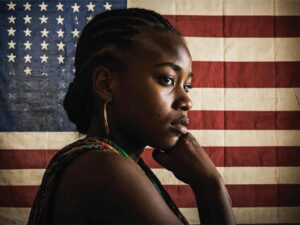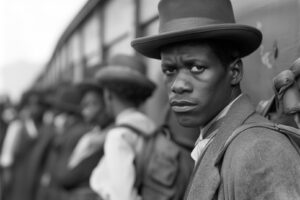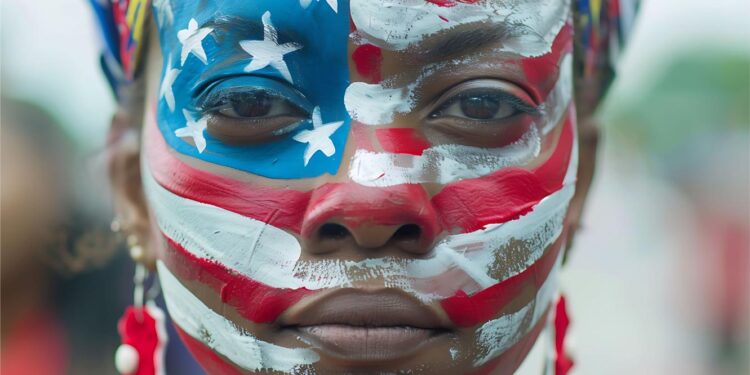In the complex landscape of American politics, understanding the voting patterns of Black Americans is crucial. As we approach the 2024 elections, the significance of Black America’s political influence cannot be overstated. This article delves into historical trends, current factors, and future projections to answer the pressing question: Which way will Black America vote in 2024?

A Brief History of Black Voting in America
Pre-Civil Rights Era
Black Americans faced significant barriers to voting before the Civil Rights Movement. From poll taxes to literacy tests, systemic racism kept many from exercising their right to vote. However, the perseverance of Black leaders and communities laid the groundwork for future generations.
The Civil Rights Movement
The Civil Rights Movement marked a turning point. The Voting Rights Act of 1965 dismantled many legal barriers, leading to a significant increase in Black voter registration and participation. This era established the foundation for the political power Black Americans wield today.

Post-Civil Rights Era to Present
Since the Civil Rights Movement, Black voter participation has continued to evolve. Key moments, such as the election of Barack Obama, have highlighted the growing political engagement and influence of Black voters. Today, Black Americans remain a pivotal demographic in elections.
Factors Influencing Voting Behavior
Socioeconomic Factors
Education and Employment: Higher levels of education and stable employment often correlate with increased political participation. In recent years, efforts to improve educational and employment opportunities within Black communities have been pivotal.
Income Levels: Economic challenges can deter voter participation, making economic justice a critical issue for Black voters.

Social Issues
Criminal Justice Reform: Issues like police brutality and mass incarceration deeply affect Black communities, driving political activism and influencing voting decisions.
Healthcare: Access to affordable healthcare is another major concern. The disparities in healthcare access and outcomes highlight the importance of policies aimed at closing these gaps.
Housing: Affordable housing is a pressing issue. The struggle for fair housing practices continues to shape political engagement within Black communities.
Political Representation
Black Candidates: The presence of Black candidates often boosts voter turnout within Black communities. Seeing representation in political offices inspires greater participation and trust in the political process.
Party Alignment: Historically, Black voters have aligned more with the Democratic Party. However, shifts in party policies and platforms can influence this alignment, making it essential to monitor ongoing changes.
The 2020 Election Recap
Black America’s Impact on the 2020 Election
Voter Turnout Rates: The 2020 election saw record-high Black voter turnout. This surge played a crucial role in determining the outcome, particularly in swing states.
Key Issues: Issues such as systemic racism, healthcare, and economic justice were at the forefront of Black voters’ minds in 2020, influencing their choices at the polls.
Regional Differences: Regional differences also emerged, with varying priorities and levels of engagement across different states and communities.
Current Political Climate
The Political Landscape in 2024
Democratic Strategies: The Democratic Party continues to court Black voters with promises of social justice, economic reform, and representation. Strategies include targeted campaigns and addressing key issues relevant to Black communities.
Republican Approaches: The Republican Party is also making efforts to appeal to Black voters, focusing on economic opportunities, school choice, and criminal justice reform.
Third-Party Influences: While less prominent, third-party candidates and movements can impact voter decisions, especially if they address unmet needs or concerns of Black communities.
Key Issues for Black Voters in 2024
Economic Justice: Creating jobs that offer fair wages and opportunities for advancement is a priority. Policies aimed at boosting employment in Black communities can sway votes.
Wealth Gap: Addressing the racial wealth gap is crucial. Initiatives that promote economic equality resonate deeply with Black voters.
Social Justice: Ongoing efforts to reform policing practices and reduce instances of brutality are critical. Black voters demand accountability and justice.
Voting Rights: Protecting and expanding voting rights remains a top issue. Combatting voter suppression tactics is essential for ensuring fair elections.
Education Reform: Improving access to quality education is vital. Policies that enhance educational opportunities for Black students are highly valued. Addressing the burden of student loan debt can significantly impact voting behavior, as many Black Americans are disproportionately affected.
Influence of Black Leaders and Organizations
Prominent Black Political Figures: Influential Black leaders continue to shape political discourse and voter engagement. Their endorsements and advocacy can sway public opinion and mobilize voters.
Key Organizations: The NAACP plays a vital role in advocating for Black rights and mobilizing voters. Their efforts in education, legal advocacy, and community organizing are impactful. The Black Lives Matter movement has brought significant attention to issues of racial injustice, influencing political activism and voter turnout.
Media’s Role in Shaping Public Opinion
Traditional Media: News outlets and traditional media continue to shape public opinion, providing coverage and analysis of key issues affecting Black voters.
Social Media: Social media platforms are increasingly influential. They offer spaces for discussion, mobilization, and the spread of information, both accurate and misleading.
Challenges to Voter Participation
Voter Suppression Tactics: Strict voter ID laws can disenfranchise Black voters. Efforts to combat these laws are ongoing. Gerrymandering dilutes the voting power of Black communities. Advocacy for fair districting is crucial.
Misinformation and Disinformation: The spread of fake news and disinformation can confuse and mislead voters, impacting their decisions at the polls. Manipulation of social media platforms by malicious actors poses a significant threat to fair elections.
Potential Outcomes
Possible Election Scenarios
Swing States: Black voters in swing states hold significant power. Their turnout and preferences can determine the overall election outcome.
Urban vs. Rural Voting Patterns: Differences between urban and rural voting patterns among Black Americans can highlight regional priorities and concerns.
Conclusion
The voting trends of Black America in 2024 will be shaped by historical patterns, current issues, and the political landscape. Understanding these factors is essential for predicting election outcomes and addressing the needs of Black communities. As we move forward, the political influence of Black America will continue to grow, driven by advocacy, representation, and a commitment to justice.
FAQs
What are the main issues for Black voters in 2024? The main issues include economic justice, social justice, education reform, healthcare, and voting rights.
How has Black voter turnout changed over the years? Black voter turnout has increased significantly since the Civil Rights Movement, with notable surges in recent elections, such as in 2020.
What impact do Black political leaders have on voting behavior? Black political leaders can greatly influence voting behavior by advocating for policies that address community needs and by inspiring greater voter turnout.
What are the major challenges facing Black voters? Major challenges include voter suppression tactics, misinformation, and economic disparities that can hinder political participation.
How can one stay informed about Black voting trends? Staying informed through reliable news sources, social media platforms, and organizations like the NAACP and Black Lives Matter is essential for understanding Black voting trends.










